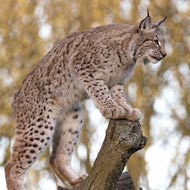Stakeholders meet to discuss lynx project

Consultations with stakeholders are set to continue into summer and local consultations are expected to start in July.
Proposals to reintroduce lynx in the UK are gathering pace, as key stakeholders met this week to discuss the proposals and research in more detail.
Just over a year ago, the Lynx UK Trust revealed plans to reintroduce the species, which has been absent from the country for more than 1,300 years.
It is proposing to carry out an initial trial release of under 10 animals for an extensive period of monitoring. A range of national stakeholders have been responding to the proposals over the past few months and, this week, 20 of the groups met representatives from the trust.
Topics discussed at the meeting, which was hosted by the University of Cumbria, included the suggested release plan and schedule, potential risks to livestock, farming and other wildlife, the impact on the UK's deer population and the potential for eco-tourism benefits.
Dr Paul O'Donoghue, the trust's chief scientific advisor, said the event was "extremely constructive". Some stakeholders, particularly sheep farming groups, stated that they oppose the reintroduction, however. The trust says it believes working directly with these groups on agreeable protocols for the trial is the best way to address their concerns.
The meeting was also attended by Jason Sinden, head of investment and property at Tilhill Forestry. He said the forestry would support the trial reintroduction if key concerns raised by stakeholders could be resolved - including the active involvement of farming and forestry interests on the advisory panel.
Consultations with stakeholders are set to continue into summer and local consultations are expected to start in July. The trust also hopes to announce the first potential release site in the next month.



 The Animal and Plant Health Agency (APHA) has updated its online reporting service for dead wild birds.
The Animal and Plant Health Agency (APHA) has updated its online reporting service for dead wild birds.